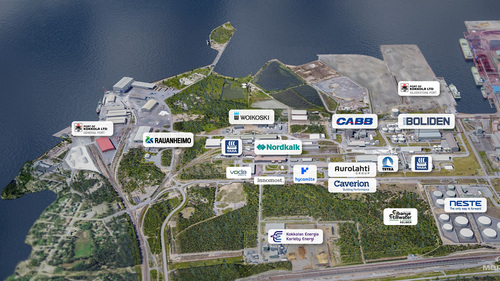Hycamite’s technology to decarbonize shipping awarded AiP by industry leader DNV
Kokkola, Finland – DNV awarded Hycamite an Approval in Principle (AiP) for its concept design of a pre-combustion, solid-form carbon capture system that produces hydrogen from LNG onboard ships using Hycamite’s Thermo-Catalytic Decomposition (TCD) technology. This is the first time DNV has recognized this type of technology in an AiP.
Hycamite’s proprietary Thermo-Catalytic Decomposition (TCD) technology offers a new approach to producing clean hydrogen by breaking down methane, the primary component of liquefied natural gas (LNG), into hydrogen gas and solid carbon. Unlike conventional methods that emit carbon dioxide, Hycamite’s process uses heat and recyclable catalysts in an oxygen-free environment, resulting in zero CO₂ emissions and generating valuable solid carbon byproducts such as graphite and carbon nanofibers.
This innovation is notable for its ability to tackle the challenges of decarbonization in maritime transportation. Hycamite’s promising new solution with methane-splitting technology may enable the use of hydrogen onboard larger LNG-powered deep-sea vessels. The onboard system allows vessels to convert LNG into hydrogen during operation, providing a clean fuel source for dual-fuel engines or fuel cells. Simultaneously, the solid carbon is captured and stored onboard, eliminating the need for liquid hydrogen infrastructure and significantly reducing greenhouse gas emissions. If biomethane is used as a fuel, operation of the vessel is potentially carbon negative.
“This milestone marks a significant step forward in sustainable shipping and low-carbon energy innovation,” says Laura Rahikka, CEO of Hycamite. “DNV’s Approval in Principle highlights the viability of our methane-splitting technology and its potential for maritime applications. By enabling onboard hydrogen production from LNG and capturing carbon in solid form, our solution offers a practical alternative to liquefied hydrogen while dramatically reducing greenhouse gas emissions.”
“At DNV, there is nothing that makes us more proud than helping to enable the deployment of truly novel technologies,” added Torill Grimstad Osberg, Senior Principal Expert in the Alternative fuels and piping systems section at DNV Maritime. “This AiP is the first time we have recognized a pre-combustion carbon capture technology designed for shipboard hydrogen production, and we congratulate Hycamite on their innovative and forward-looking approach to tackling shipping’s decarbonization challenge. Because as the maritime industry works towards net zero, finding new fuel solutions that are efficient, scalable and green is vital. We look forward to building on this cooperation and are ready to put our expertise towards helping to safely realize the benefits of this innovative technology.”
This breakthrough technology can potentially reshape the future of shipping by enabling onboard hydrogen generation from LNG without requiring new fueling infrastructure. By capturing carbon in solid form, it also supports the creation of a circular carbon economy while at sea, offering a practical path to decarbonize LNG-powered vessels and reduce greenhouse gas emissions across global fleets.
An Approval in Principle (AiP) is an independent evaluation of a concept based on a predefined framework of requirements. It confirms the feasibility of the design and ensures there are no significant technical obstacles hindering its implementation.
Latest news
Clariant catalysts will power the Ecoplanta: Europe's first waste-to-methanol plant
Chemmed Cluster Tarragona →Repsol is building Europe’s first plant to produce renewable methanol from urban waste The facility will use Enerkem gasification technology to produce 240 KTA of methanol Clariant will supply cata...
Lilly plans to build a new $3 billion facility to boost oral medicine manufacturing capacity in Europe for patients worldwide
Netherlands site will bring 500 manufacturing and 1,500 construction jobs while further strengthening Lilly's global supply chain
Ports of Duisburg and Rotterdam advance energy transition together
Port of Rotterdam →With this LoI, the two major European logistics hubs reinforce their goal of jointly developing sustainable transport corridors via waterways as well as future-oriented initiatives for the energy t...
BASF constructs new electronic grade ammonium hydroxide plant in Ludwigshafen
BASF SE, Ludwigshafen →State-of-the-art facility to support the development of the advanced European semiconductor industry. New capacity meets growing demand for the manufacturing of chips in Europe


